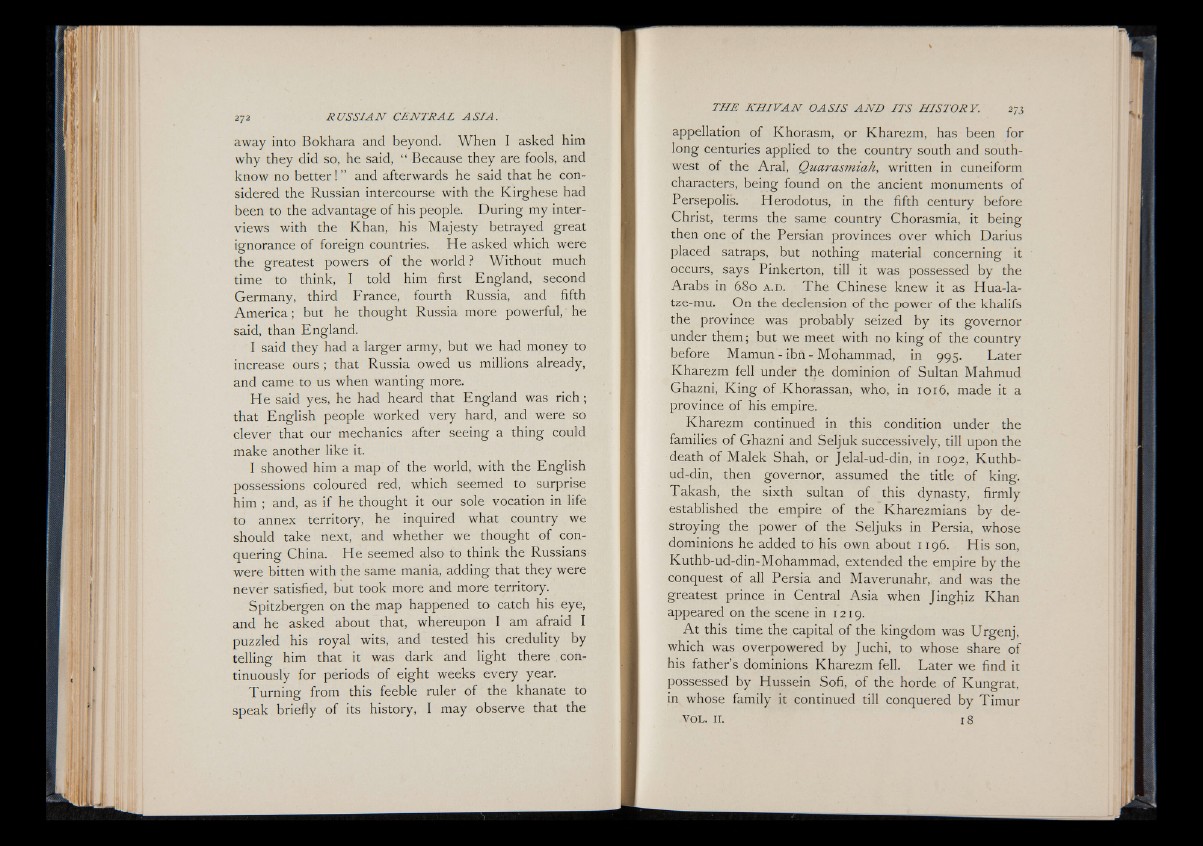
away into Bokhara and beyond. When I asked him
why they did so, he said, “ Because they are fools, and
know no better! ” and afterwards he said that he considered
the Russian intercourse with the Kirghese had
been to the advantage of his people. During my interviews
with the Khan, his Majesty betrayed great
ignorance of foreign countries. He asked which were
the greatest powers of the world ? Without much
time to think, I told him first England, second
Germany, third France, fourth Russia, and fifth
America; but he thought Russia more powerful, he
said, than England.
I said they had a larger army, but we had money to
increase ours ; that Russia owed us millions already,
and came to us when wanting more.
He said yes, he had heard that England was r ich ;
that English people worked very hard, and were so
clever that our mechanics after seeing a thing could
make another like it.
I showed him a map of the world, with the English
possessions coloured red, which seemed to surprise
him : and, as if he thought it our sole vocation in life
to annex territory, he inquired what country we
should take next, and whether we thought of conquering
China. He seemed also to think the Russians
were bitten with the same mania, adding that they were
never satisfied, but took more and more territory.
Spitzbergen on the map happened to catch his eye,
and he asked about that, whereupon I am afraid I
puzzled his royal wits, and tested his credulity by
telling him that it was dark and light there continuously
for periods of eight weeks every year.
Turning from this feeble ruler of the khanate to
speak briefly of its history, I may observe that the
appellation of Khorasm, or Kharezm, has been for
long centuries applied to the country south and southwest
of the Aral, Quarasmiah, written in cuneiform
characters, being found on the ancient monuments of
Persepoli's. Herodotus, in the fifth century before
Christ, terms the same country Chorasmia, it being
then one of the Persian provinces over which Darius
placed satraps, but nothing material concerning it
occurs, says Pinkerton, till it was possessed by the
Arabs in 680 a .d . The Chinese knew it as Hua-la-
tze-mu. On the declension of the power of the khalifs
the province was probably seized by its governor
under them; but we meet with no king of the country
before Mamun - ibn - Mohammad, in 99.5. Later
Kharezm fell under the dominion of Sultan Mahmud
Ghazni, King of Khorassan, who, in 1016, made it a
province of his empire.
Kharezm continued in this condition under the
families of Ghazni and Seljuk successively, till upon the
death of Malek Shah, or Jelal-ud-din, in 1092, Kuthb-
ud-din, then governor, assumed the title of king.
Takash, the sixth sultan of this dynasty, firmly
established the empire of the Kharezmians by destroying
the power of the Seljuks in Persia, whose
dominions he added to his own about 1196. His son,
Kuthb-ud-din-Mohammad, extended the empire by the
conquest of all Persia and Maverunahr, and was the
greatest prince in Central Asia when Jinghiz Khan
appeared on the scene in 1219.
A t this time the capital of the kingdom was Urgenj,
which was overpowered by Juchi, to whose share of
his father’s dominions Kharezm fell. Later we find it
possessed by Hussein Sofi, of the horde o f Kungrat,
in whose family it continued till conquered by Timur
VOL. II. 18